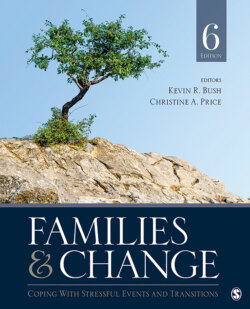Читать книгу Families & Change - Группа авторов - Страница 14
На сайте Литреса книга снята с продажи.
Family Stress Theory Ecological/Systems Perspective
ОглавлениеFamily theorists typically have used an ecological or systems approach (e.g., Bronfenbrenner, 1979) in their conceptualization of families under stress. As a result, families are viewed as living organisms with both symbolic and real structures. They have boundaries to maintain and a variety of instrumental and expressive functions to perform to ensure growth and survival (Anderson, Sabatelli, & Kosutic, 2013; Boss, 1988, 2013). As any social system, families strive to maintain equilibrium. Families are the products of both subsystems (e.g., individual members, dyads) and suprasystems (e.g., community, culture, nation).
Although most general stress theories have focused only on the individual, the primary interest of family stress theory is the entire family unit. Systems theory states that the system is more than the sum of its parts (Anderson et al., 2013; Boss, 2006; Hall & Fagan, 1968). In terms of families, this means that a collection of family members is not only a specific number of people but also an aggregate of particular relationships and shared memories, successes, failures, and aspirations (Anderson et al., 2013; Boss, 1988, 2002). At the same time, systems theory also involves studying the individual to more completely understand a family’s response to stress.
An ecological/systems approach allows the researcher to focus beyond the family and the individual to the wider social system (suprasystem). Families do not live in isolation; they are part of the larger social context. This external environment in which the family is embedded is referred to as the “ecosystem,” according to ecological theory. This ecosystem consists of historical, cultural, economic, genetic, and developmental influences (Anderson et al., 2013; Boss, 1988, 2002). Thus, the family’s response to a stressor event is influenced by living in a particular historical period, its cultural identification, the economic conditions of society, its genetic stamina and resistance, and its stage in the family life cycle.
